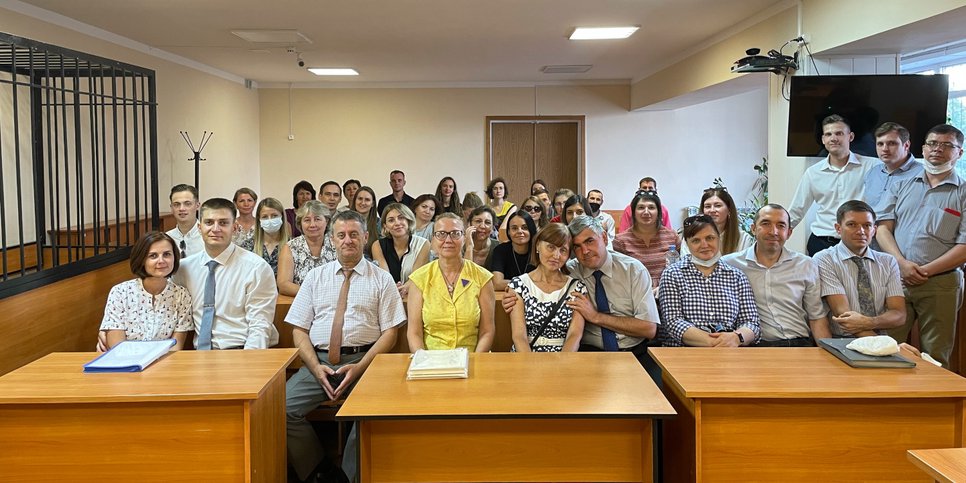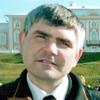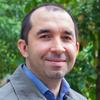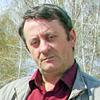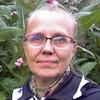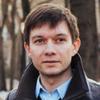Defendants with their families and friends shortly before the verdict was announced (Saransk, August 2022)
Defendants with their families and friends shortly before the verdict was announced (Saransk, August 2022)
A Mordovia Court Sentenced Six Saransk-Based Jehovah's Witnesses, Including a Woman, to Two to Six Years in Prison for Practicing Their Faith
MordoviaOn August 25, 2022, Yelena Simonova, judge of the Leninskiy District Court of Saransk, sentenced six Jehovah's Witnesses, including a woman and a father of two young children, to gross terms of imprisonment in a penal colony just because of their religion.
The prosecutor requested 2.5 years in a penal colony for Shevchuk, Antonov and Korolev, 4 years and 2 months for the Nikulins, and 6.5 years for Atryakhin. Despite the absence of victims in the case, the court assigned real terms of imprisonment to all believers: for Vladimir Atryakhin—6 years, for Georgiy Nikulin and his wife Yelena—4 years and 2 months each, for Aleksandr Shevchuk, Aleksandr Korolev and Denis Antonov—2 years each. The believers were taken into custody in the courtroom.
The criminal prosecution of believers began on February 6, 2019, when a series of searches and detentions took place in Saransk. On the same day, the three detainees were sent to custody, where they subsequently spent from 51 (Atryakhin) to 147 days (Nikulin and Shevchuk). They were accused of organizing, continuing, and financing the activities of an extremist organization (Parts 1, 1.1, and 2 of Article 282.2 of the Criminal Code of the Russian Federation) because of talking about the Bible. The investigation of the case was carried out by the investigator of the Investigative Department of the FSB of Russia in the Republic of Mordovia, E. V. Makeev. Long before the ban on legal entities of Jehovah's Witnesses in Russia, back in 2003-2004, he himself was interested in the Bible and, together with his wife, attended services of Jehovah's Witnesses.
At the time of Vladimir Atryakhin's arrest, his children were 9 months and 2 years old. According to him, during his stay in the pre-trial detention center, worrying about his family was a difficult test for him. In places of detention, he also faced pressure: “The conditions of life in detention were difficult, especially at first. The staff of the pre-trial detention center tried to humiliate, put pressure on . . . Constant searches. During the day it was impossible to lie on the bed, only sit on the bench. Cold. Instead of a mattress, in fact, a piece of fabric on top of a sheet of iron.
Denis Antonov lost his business due to a criminal case. He and his wife, Olga, were forced to work odd jobs to take care of themselves and their elderly mother, Olga, in their care.
Yelena Nikulina, while her husband was in jail, was left without a job and a livelihood. Also, she was not allowed to meet with her husband. And a year after the search, the family lost their homes due to a fire. According to Yelena, fellow believers came to the rescue: “During this period [after the fire], we felt like members of a global family. Support poured in from all over the world, and after 4 months we had a small apartment.”
Other defendants also felt the support of those who are not indifferent. “At the moment, my wife and I have everything we need and even more,” said Denis Antonov. Aleksandr Shevchuk, who is a descendant of Jehovah's Witnesses who were repressed in 1951, recalls: “Letters brought particular joy. Each of them had something just for me.”
The Russian government has repeatedly stated that the decisions of the Russian courts to liquidate and ban organizations of Jehovah's Witnesses "do not evaluate the dogma of Jehovah's Witnesses, do not contain restrictions or prohibitions on individually practicing the above doctrine." The European Court of Human Rights declared the criminal prosecution of Jehovah's Witnesses unlawful.
